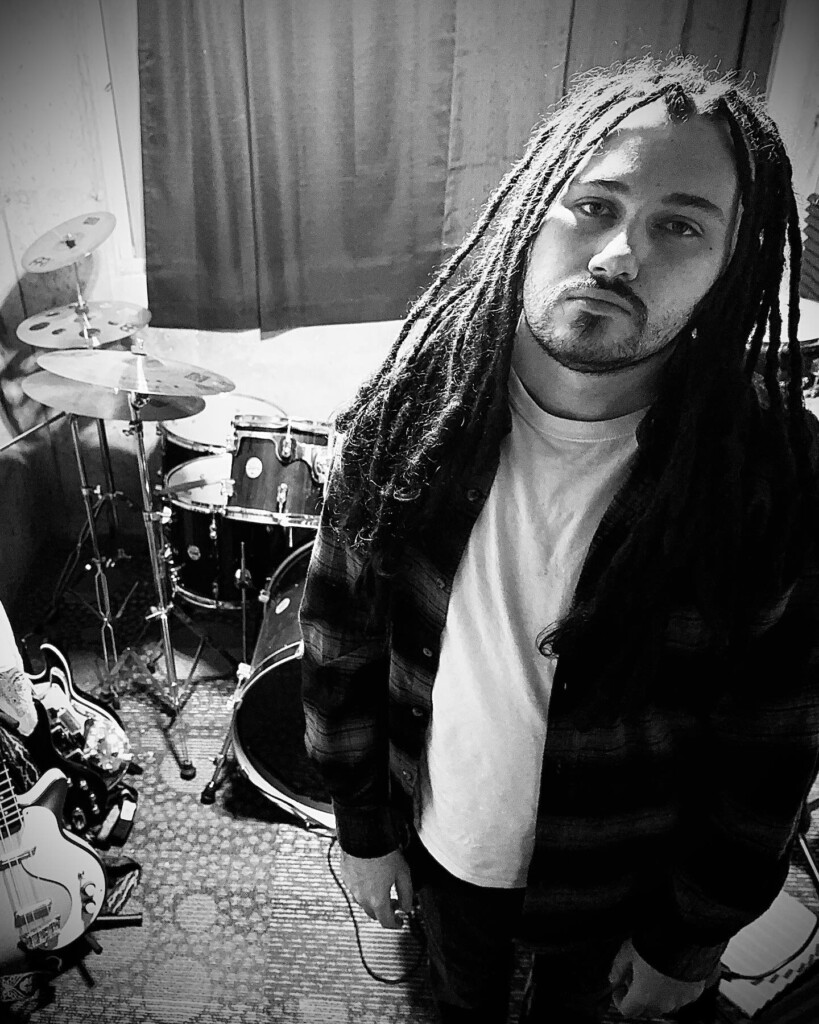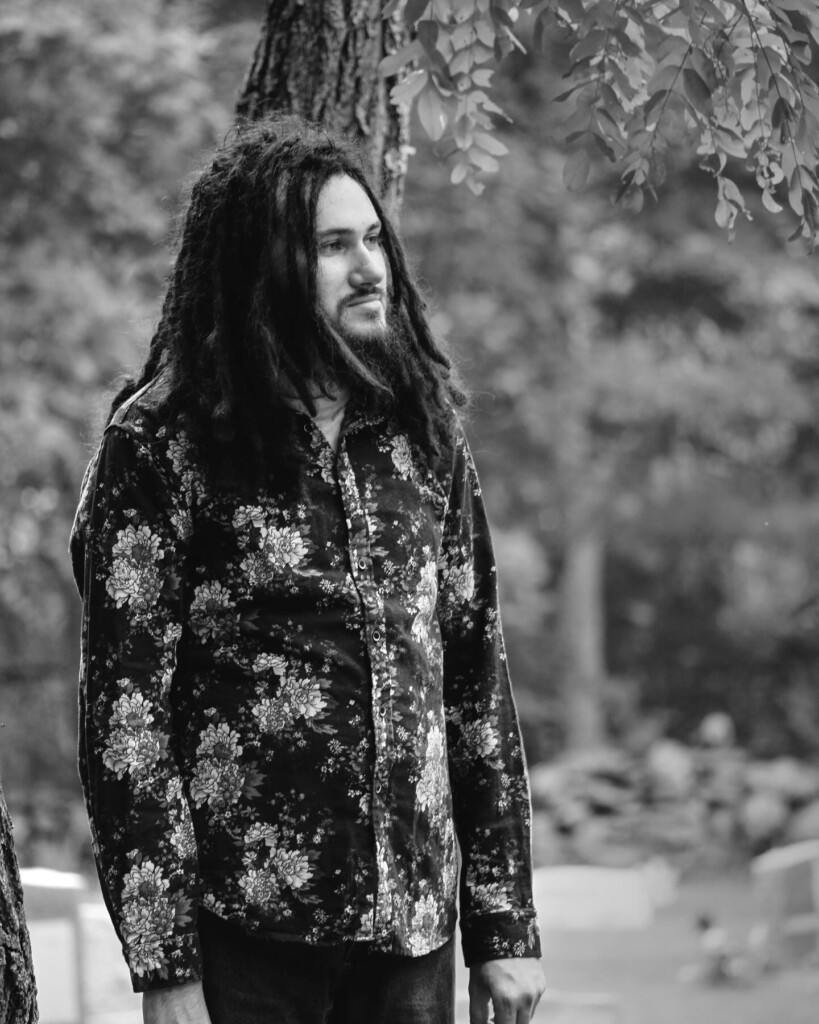Hyporadar is the passion project of Shane Duquette. Combining different genres and influences such as blues, grunge, and jazz, Duquette creates low rock in the style of 90s music. Check out the exclusive interview below:

1. Did your musical journey begin with formal training, or was it more of a personal exploration? How has that shaped your unique approach to your craft?
Hyporadar: It was defiantly a personal exploration. I played around on the bass for years before taking music classes in high school, but it was just theory. My first and only set of lessons came in college from a classical guitar teacher so it wasn’t even a bass teacher. I think this helped shape what I do because I take such a bass heavy approach that explores what the low tones can do, just like I did when I started out.
2. Who were some of the most influential figures in your early musical life, and how did they inspire your sound? Also, what’s the story behind choosing the name ‘Hyporadar’?
Hyporadar: Mark Sandman inspired my sound. I love his style in Morphine and his solo work, so I wanted to use his work as reference for mine. He is the main influence but to name somes other there is Steven Wilson, Devin Townsend, and Victor Wooten. In terms of my name I went back and forth on a few different ideas. I eventually thought to just go literal since when you start out you are “under the radar”, so I went with that.
3. What do you believe sets your music apart? How would you describe your sound to someone discovering you for the first time, and what emotions or experiences do you hope to evoke in your listeners?
Hyporadar: I think the lack of guitar gives my music some character. There are some things you get used to with music and one thing that doesn’t normally change is the guitar, bass, and drums set up in rock music. Adding something else is normal but taking one of those away makes you notice it more. For someone first experiencing my music I always say “its low rock, rock music with no electric guitar”. I hope by giving that idea of rock music missing a key ingredient gives it a mysterious vibe.
4. For most artists, originality is first preceded by a phase of learning and, often, emulating others. What was this like for you? How would you describe your own development as an artist and music maker, and the transition towards your own style, which is known as ROCK?
Hyporadar: I feel that originality has never been an issue for me. My writing style ends up basic where I write for bass, drums, and vocals based of an idea. The hardest thing is since I don’t use guitar solos, trying to find something else to fill the space in every song can be a little challenging. I am looking forward to what I will eventually work on and would be happy to collab with others in the future.

5. Music often transcends entertainment. What’s your view on the role and function of music as political, cultural, spiritual, and/or social vehicles – and do you try and affront any of these themes in your work, or are you purely interested in music as an expression of technical artistry, personal narrative, and entertainment?
Hyporadar: I don’t personally put my views in my music, but I think it is a great thing to do. It can help form a connection between artist and fan when there is a mutual agreement. I don’t have a reason why I keep my views out, I just don’t want to. I’d rather give my listeners a break from hearing personal views and give them something they can use to escape those.
6. What’s been the most challenging hurdle in either your personal life or music career, and how has it shaped you as an artist?
Hyporadar: Creativity isn’t a hurdle which is what I thought would be the hardest thing. The hardest has been getting my music out their. Nagging people to listen to your music can be hard to do since it just turns into the only thing you will talk about. As much as I don’t want to be annoying like that I’ve gotten over it and just post and talk about my music whenever I want.
7. On the flip side, what moment or achievement in your career so far has made you feel the proudest, and why? And let’s talk about your latest release and future plans.
Hyporadar: My proudest achievement has been what I have built up. Seeing my social account with real followers and getting numbers from streaming services of people who are genuinely interested in listening to my work is all I can ask for and what I am the proudest of. My latest release “Frankie & Estelle” got more attention than I expected for the few months it’s been out so that inspires me to keep going and work on my second full length. My new songs are some of my favorites and I’m really excited to finish it
8. With social media having a heavy impact on our lives and the music business in general, how do you handle criticism, haters, and/or naysayers in general? Is it something you pay attention to, or simply ignore?
Hyporadar: I read every articles, review, and post about my work. I especially love the negative ones because they always make it seem like they know what I’m doing better than me. I read them but ignore what they say because I’m happy with my work and what I am doing.
9. Creative work in a studio or home environment, or interaction with a live audience? Which of these two options excites you most, and why?
Hyporadar: I enjoy the home environment. I record and mix everything at home and love the ability to just work on it whenever I want. It will be 3AM and I’ll wake up with an idea so I just head to my laptop and get to work until I fall asleep again, and that’s what I want to do. I want my live shows to be an experience, so I haven’t pinpointed what I want to do yet, so for now I stick to the studio.
10. Do you think is it important for fans of your music to understand the real story and message driving each of your songs, or do you think everyone should be free to interpret your songs in their own personal way?
Hyporadar: I think it’s up to everyone to form their own opinion. I’ve always said that some of my songs are autobiographical, some are exaggerated from real events, and some are completely made up, and I think it’s up to the audience to guess. I think that gives the audience a chance to relate to the song if they want, but if they don’t want to find a meaning to it they don’t have to.
STAY IN TOUCH:
FACEBOOK | INSTAGRAM | SPOTIFY | BANDCAMP | WEBSITE | YOUTUBE


